How interviews for the position of the NABU Head were held
Mind keeps following the course of the government tender
From February 28 to March 2, 2023, the tender commission for the position of the National Anti-Corruption Bureau of Ukraine Director hosted interviews to determine whether the candidates meet the competence criterion. These were the final interviews, after which the Commission will select three winners of the competition. The Cabinet of Ministers of Ukraine will appoint one of the three winners as the NABU Director.
During the first five minutes, the candidate tells everything about himself or herself that he considers necessary. He speaks about his vision of leading the NABU. Then, each of the six members of the commission in turn asked the candidate several questions. Finally, the candidate also shares his impressions of the interview for up to three minutes.
According to the commission head, Mykola Kucherianenko, "the commission's task at the final stage is to comprehensively assess the professional experience, motivation, knowledge and qualities of the candidates for the position of NABU Director and to determine three winners of the competition."
Mind has reviewed all 11 interviews and shares the main points that the candidates for the NABU head were able to convey. And also about the questions the candidates were unable to answer. .
What the commission assessed during the interview:
- Knowledge of national legislation and relevant international law;
- their application in the case law of the Supreme Court, the Constitutional Court of Ukraine and the European Court of Human Rights;
- candidate's awareness of the provisions of international standards on preventing and combating corruption, other international treaties and conventions applicable to the NABU's activities;
- strategic and analytical thinking;
- leadership and understanding of the NABU's mission and tasks;
- human resources management;
- understanding of the fundamental principles of professional ethics;
- how effective personal, internal and external communication is, in particular, for positioning the NABU and its work in society.
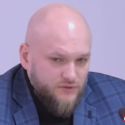
Oleksandr Tsyvinsky
For 20 years, he worked in pre-trial investigation bodies – from an investigator at a police station to the head of one of the investigative units, then as a NABU detective, then senior detective. At the same time, he became a polygraph examiner. He was engaged in scientific practice and acted as a trainer.
He emphasised that he has been working at the NABU for seven years, so he knows all its pitfalls and the reasons for their appearance.
He spoke about his plans as head of the NABU as follows: "I want to develop a culture of strategic direction, set priorities correctly and regularly monitor their implementation. I want to introduce a system for detecting criminal organisations using strategic analytics and artificial intelligence. I would like to create a new unit for operational development; we also need to conduct systematic staff training and exchange best practices."
He was the only among all the candidates to propose to develop jointly with SAP performance priorities, organise joint training for detectives and prosecutors, and create specialisation profiles for detectives and prosecutors in certain complex areas of investigation, such as international crimes.
"Your speech was impressive. I felt like I was at a dissertation defence," said one of the commission members, Kyrylo Legkykh.
Like the other candidates, he suggested expanding the staff, creating an expert institution, introducing offline wiretapping, increasing the number of premises, and updating equipment to make the NABU more independent.
He also wants digitalization to enable lawyers to review criminal proceedings remotely, "wherever it is convenient for them."
To the question: "Does he think it is fair that society is dissatisfied with the NABU's work because it believes that it is a waste of resources?" he replied that "the security and defence sector, judges and prosecutors, and financial investigations should become new priorities in NABU investigations, but there must also be a reaction to the National Agency for Corruption Prevention's order on violations in declarations."
The candidate's face changed from confident to gloomy when he was asked about working with colleagues at the NABU. The Commission noted that about ten of his subordinates had resigned or been transferred to other positions. The total number of employees in the unit is 12-15 people.
"The Commission has received many letters from NABU employees who "do not characterise your qualifications in work very positively". What is the reason for this?" the candidate was asked.
"Some of my colleagues transferred to their place of permanent residence, and I fired one because he was not performing well," he replied succinctly. At the same time, he said nothing about the bad reviews of his work.
The commission summarised: "Your speeches are a political programme."
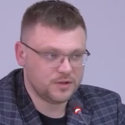
Semen Kryvonos
The current head of the State Inspectorate of Architecture and Urban Planning was criticised by the commission for having no experience in law enforcement.
"I do not believe that my lack of experience as a law enforcement officer is an obstacle. On the contrary, it can be an incentive. My managerial experience, my experience of launching a new institution in an absolutely aggressive environment... I think I have these qualities to face the challenges that exist in the work of the NABU," Mr. Kryvonos said.
He did not directly answer the question about the priority areas of work: "First of all, I will analyse the operational activities and, taking into account the initial data, I will listen to the heads of the relevant departments. I will make an informed decision.".
He tried to convince the commission that in order for the team to accept him, "I need to prove to the team that we have common values, a common goal... I have experience of communicating within NABU with some departments... I will show that I am competent and ready to listen to suggestions, not to impose my opinion. To build joint plans. The main thing is to be inspired by common motivation, common values...".
When it comes to ideas for the development of the NABU, Kryvonos proposed to increase the number of NABU staff and create up to seven territorial units, "because 20% of employees are involved in the operations of the Defence Forces and the workload of detectives has increased."
In the candidate's opinion, the NABU's effectiveness can be achieved by increasing the "quality of detective units": "We need to strengthen the analytical and information units. Territorial units are needed to strengthen communication with whistleblowers and representatives of civil society on the ground."
The candidate described his action programme as follows: "To preserve the independence of this institution, improve efficiency by implementing provisions on the removal of information from electronic communication systems; in-house expertise; advocacy for changes to legislation to improve plea bargaining; strengthening international cooperation; strengthening communication policy; communication with civil society and specialised NGOs and professional organisations."
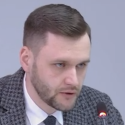
Viktor Pavlushchyk
Viktor Pavlushchyk has been working as a detective since the very beginning of the NABU's operation. Among his achievements, he said that "every eighth criminal case that has been brought to court is one that I investigated." The commission members reacted sharply: "We would like to hear more about your motivation, not about how well your department is doing under your leadership."
He announced his intention to strengthen the team from within during his first six months at the NABU, create conditions to prevent burnout, improve analytical work, narrow the specialisation of detectives in a specific area of crime (for example, to create a unit to deal with crimes in the military sphere), and strengthen units that investigate crimes in the military environment.
The Commission asked all the candidates what safeguards they propose to put in place to ensure that the funds granted to Ukraine for reconstruction are not stolen. "We need to strengthen the Bureau's work on preventive and intelligence work. This will allow us to act at the stage of detecting intent. Building an operational and preventive unit is one of the priorities for today," Pavlushchyk said.
When asked whether the candidate feels able to move from investigating crimes to strategic planning and management of the organisation, to administrative functions, he replied: "Yes, I will do my best to make it happen."
The question of what preventive measure he could propose to overcome corruption proved to be very difficult for the candidate. After a very long pause, Pavlushchyk said that this would require "filling the gaps in the legislation that allow corruption offences to be committed".
In response to this phrase, one of the commission members asked with a smile: "Perhaps, at the legislative level, we should abandon cash?"
Pavlushchyk was also unable to clearly answer the question "How to unite a team? Please give specific examples." "Communication, direct communication with employees," he said briefly.
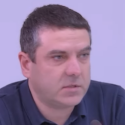
Volodymyr Tserkovny
He investigated criminal offences before joining the NABU. Since 2016, he has been heading the detective department at the bureau, and in January 2023, he was promoted to deputy head of the unit (which has three departments).
As for the motivation for participating in the competition, he was the most convincing of all the candidates. He spoke reasonably about how much he enjoyed working at the NABU: "I was inspired to join the NABU by the opportunity to develop and a great team of like-minded people – people who were not satisfied with working in other law enforcement agencies."
Speaking about his plans for the near future if he wins the competition, he proposed to increase the bureau's staff (especially for specialised analytical and operational units), create an independent expert unit and introduce autonomous wiretapping. To create an expert institution, he proposes to hold an open competition with the involvement of the public and lie detector testing of candidates.
Like the other candidates, he spoke about the introduction of electronic criminal proceedings (e-case) instead of paper ones: "This process is now at the initial stage of implementation."
He spoke about how he motivated his team, singled out and publicly praised the best and had one-on-one conversations with the detectives with the worst performance to find out why: "Every one of my subordinates knows that they can come to me with any question, and I will give them advice. We sit down together and consult, make a joint decision. When a detective sacrifices his or her time to help a colleague, it is an indicator of good teamwork."
When the commission asked the candidate to name the principles of the new anti-corruption strategy, he said, "to be honest, I can't remember right now."
The commission also asked whether the candidate saw a conflict of interest in the fact that there was only one person among the recommendations, and that was his immediate superior. "I don't see a conflict 100%," Mr. Tserkovny said. "His 100% rating is not subjective, but objective. He would have pointed out the shortcomings. It would be a bigger conflict of interest to point out people who have seen [me] for a few hours in their lives at high-profile events. And this person has known me for seven years."
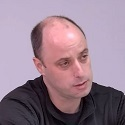
Yuriy Belousov
The commission acknowledged that Belousov had done a lot to develop his unit and that this was well known and talked about. Therefore, it was asked whether he was not sorry to leave the OPG. "I have created the maximum conditions for my successor to move forward in the direction we have laid as a foundation," the candidate explained.
In his opinion, the head of the NABU is first and foremost a manager who must create conditions for the effective work of the entire agency and establish interaction between all structural elements. The ideal profile of the NABU head is a person who understands investigations, the organisation of processes, and the need for staff development: "The person who will lead NABU should have skills different from those of an investigator or prosecutor. Supervisors-prosecutors and supervisors-investigators are regularly interfering in the cases of their subordinates and giving them advice and instructions on how they should investigate a particular case. This is interference with the work of independent actors."
"I have experience in systemic transformations, I have experience in crisis management under conditions of uncertainty," Belousov described his strengths, "I have experience in working with international partners. We directly interact with Europol, pre-trial and expert institutions. My versatile experience can give a new impetus to the organisation of the NABU."
When the Commission asked him about his plans for the first six months of his tenure as NABU head, Mr. Belousov said that "we need to first analyse all internal processes, put out internal fires, set clear priorities for the year, and then we can talk about building a strategic goal. I am ready to immerse myself in the environment with my colleagues, to study the problems and needs of this institution. Together with the NABU staff, we will set goals and priorities for the next three years."
The Commission was sceptical about this answer, saying that Belousov was not an expert in fighting corruption: "You have so much experience in the field of human rights violations, and you want to leave it? Right now, when this experience is so needed. And go to an institution you don't know?" In response to this accusation, Belousov said that "during the war, stealing is worse than committing war crimes. Corruption during the war is equal to sabotage against our country".
The commission members were shocked: "Are you saying that corruption is worse than killing people, raping and torturing them?"
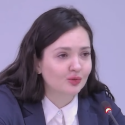
Veronika Plotnikova
She works in the OGP department that investigates human rights violations, with 10 people under her command. She worked for a short time in the prosecutor's office and then began her academic career. At the National Academy of Prosecutors, she taught criminal law and the legal basis for combating corruption. She has no experience of working at NABU. She explained that she got information about the bureau from open sources: she studied in detail the reports on the NABU's activities, anti-corruption programmes and anti-corruption strategy, public posts of the NACP, and was a member of the commission for assessing corruption risks in the PGO.
Commission member Drago Kos asked why Plotnikova's appointment as director might be perceived with scepticism, in her own opinion. "Because I have no experience of working at NABU. I have little experience as a prosecutor. I'm a woman, and I don't look so serious about my age," she said.
The candidate believes that the strategic directions of the NABU should be correlated with the new anti-corruption strategy: "The first steps in my work at NABU should be internal and external audits, as I am a new person in the system, I need to see what the operational processes are."
Ms. Plotnikova shared her ideas on how to ensure that there is zero tolerance for corruption within the NABU: "We need an internal policy in the state body aimed at avoiding this. For example, reports of personal or family ties within the agency, conflicts of interest among colleagues. This should be a black mark for the person who allows it. When it becomes important for the group, when you become unshakeable, this is one of the ways to prevent this."
The Commission noted that the candidate is applying for the position of head of a law enforcement agency with almost 700 employees, without any experience, except for essentially theoretical and strategic ones.
"The issue of the head of the NABU is not procedural, but administrative, managerial, managerial and leadership. I know what I can do and I can be responsible for the team," Plotnikova commented.
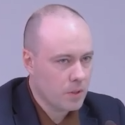
Sergiy Gupiak
Head of the Vinnytsia territorial department of the State Bureau of Investigation. He read the text about motivation from a piece of paper: "I am inspired by the challenge to take NABU to a new level. I have a good education, theoretical knowledge, work as an investigator, understanding of the work of detectives, experience of leading one of the most complex prosecutor's offices, work in the SBI in a senior position in the territorial office in Vinnytsia, and I can pass on my skills as a trainer. I have experience in public speaking and communications with the media."
When the commission members asked about his leadership skills. Mr. Gupiak spoke about his subordinate who was disappointed with the SBI's work and a year later became the best investigator among the SBI's territorial offices.
The Commission asked why Gupiak considered himself worthy of being one of the three finalists. The candidate replied: "The NABU Director must be multifaceted. He or she must have experience in investigating crimes, procedural management, and crimes with signs of corruption. He or she should have enough experience in implementing their own projects. I have something to say about each of these criteria. Therefore, I consider myself a worthy candidate."
Gupiak also received a rebuke, saying, "You and your family do not live in Kyiv, you have never worked at the NABU. There will be a lot of changes. How will you cope with it?"
The commission tried to determine the level of Gupiak's knowledge as an investigator and asked him, "What covert investigative actions did you use during the investigation of anti-corruption crimes?" In response, he listed all investigative actions "according to the Criminal Procedure Code". He described several specific criminal proceedings in which he had used them.
When asked specifically what exactly he would do to ensure that money for Ukraine's reconstruction was not lost, he gave a vague answer: "The response to such facts will be in accordance with the law, and we will register criminal proceedings and investigate such episodes. In the future, based on the practice gained from the investigation, we will send signals and impulses to the state authorities to change the procedure, change the legislation, the procedure so that these facts do not happen again in the future."
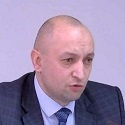
Maksym Vorvul
Mr. Vorvul has been working at the NABU territorial unit in Kharkiv for six years. His motivation for participating in the competition was his desire to develop the NABU: "The NABU should play a leading role in the state's anti-corruption policy and wants to develop the prevention of corruption crimes."
The Commission asked a lot about how the candidate plans to build relationships with colleagues. They also asked him about the criminal proceedings in which he managed to demonstrate his best qualities. Vorvul spoke about the case against the leadership of the regional council: "Due to clear planning, we were able to correctly predict the development of events and succeeded in it."
When asked how he sees the effectiveness of the fight against corruption at the current stage and how it can be improved, the candidate answered at length: "This includes the digitalisation of administrative services provided to Ukrainian citizens, reducing the powers of pressure on business, greater transparency in the work of government agencies, transparency of public procurement and improvement of the mechanism for their implementation, and ensuring the inevitability of punishment."
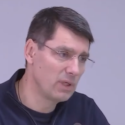
Oleg Opishniak
Mr. Opishniak works in the Prosecutor General's Office in the Internal Security Department, lives in Kyiv. His motivation for participating in the competition was that he "would like to get involved in changing our country".
When asked what he considers himself an expert in, he did not really answer, limiting himself to generalities: "I have considerable experience in law enforcement...".
The commission also asked the candidate whether he thought the NABU director should be a leader or an administrator.
"He should be both a leader and an administrator," Opishniak replied, "A leader to focus the team on important goals and prioritise them. And he should be an administrator, a manager, to ensure proper logistical support for the institution. To improve the conditions in which NABU employees work. These are premises, laboratories, places for storing documents, and rest rooms. This is the organisation and creation of units – criminal analysts, investigators-octogenarians."
Opishniak admitted that he does not speak English (which is one of the requirements for category A positions, including the position of NABU head): "I am in the process of learning. I learned French at school, but it was not useful to me in my life."
When asked about the key competences for the NABU director, he said that they were integrity and respect for other people.
"What about leadership and stress resistance?" the commission was outraged. "Yes, the director must also be stress-resistant."
The candidate's answer to the question of what kind of communication model a manager should have with each of those working for a common result sounded vague.
"Managers can shape a certain culture. They need to create a transparent and friendly environment. The manager should be as accessible as possible to ordinary detectives. I still need to think about how I would organise this," Mr. Opishniak said.
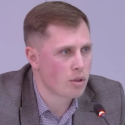
Roman Osypchuk
Since 2015, he has been working at NABU as the head of internal control. There are 21 people on the staff. He took part in competitions for the position of NAPC head, head of the Bureau of Economic Security, and now for the position of NABU head.
When describing his achievements at the NABU, the candidate stressed that "we have not documented any illegal corruption actions by NABU employees. And this does not mean that the internal control department is doing a poor job. This is a sign of good prevention."
Speaking about ways to improve the position of NABU director, Mr. Osypchuk said: "It should be leadership. I would like to improve NABU's interaction with other law enforcement agencies. Because the NABU staff is small for a country of many millions. The potential for sharing operational information has not been unlocked. We need to develop more in this direction. I would focus on automating analytical management and getting a mechanism for independent wiretapping."
In the candidate's opinion, the biggest problem of the NABU today is the inability to implement the tools planned by the anti-corruption strategy due to the lack of funding.
There were many questions about working in the internal security department, including: "You monitor the lifestyle of NABU detectives. Who monitors your lifestyle?"
The commission also noted that the candidate had written a dissertation on "Administrative and Legal Measures to Prevent Corruption in the NABU", "but only one of the ten paragraphs of the work somehow relates to the dissertation's topic . The rest is about general things. Although there are 17 points of scientific novelty, not every doctoral thesis has that many."

Sergiy Naumiuk
Head of an operational unit of NABU detectives numbering more than a thousand people. He has been working in law enforcement all his life. He started working at the NABU in 2015 and was one of the founders of the operational unit.
During his opening remarks, he read from a piece of paper that he had entered the competition "to implement his professional experience and strategic vision in the fight against corruption to build a European-style democratic society". He stressed that he was inspired to take part in the competition by the support of his team.
The candidate said that if he is elected head of the NABU, his priority will be to deploy a full-fledged operational system for preventing and detecting crimes within the NABU's jurisdiction at the early stages, intensify intelligence work with an increase in the presence of detectives in the regions, and introduce new approaches to organising covert investigative and search operations.
"This will improve the processes of documenting criminal activity and pre-trial investigation in general," Mr. Naumiuk concluded.
Like the candidates who do not work for the NABU, Naumiuk spoke of the need to conduct an internal audit "to learn about the current state of affairs in various departments and understand where to move forward."
When asked about his communication plan as director, he could not answer clearly: "As for specific investigations, we need to report on specific facts and achievements. There should be feedback in communication with the public. This is how I see it".
The candidate was also unable to answer the question in detail: "How will you respond to public criticism in cases where the investigation has not resulted in the expected outcome?" – "It should be honest and open."
And commenting on his plan of interaction with investigative journalists, he said that when information is obtained from articles, suggesting that an investigation can be started on its basis, "we will enter such investigations into the pre-trial register and carry them out".